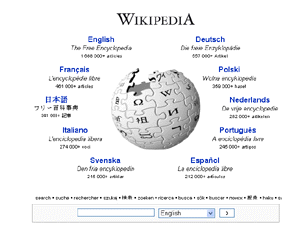 Gary sent me a link this morning that made me laugh (cry?) out loud. Apparently, a US government agency has begun using Wikipedia as a source of basic intelligence information. No kidding.
Gary sent me a link this morning that made me laugh (cry?) out loud. Apparently, a US government agency has begun using Wikipedia as a source of basic intelligence information. No kidding.
The collaboratively written online encyclopedia Wikipedia, created in 2001, has steadily grown in popularity, credibility and influence to the point that it is now used and referenced in U.S. Government intelligence products.
A March 19 profile of Indian Congress Party Leader Rahul Gandhi prepared by the Open Source Center (OSC) of the Office of Director of National Intelligence is explicitly derived from "various internet sources including wikipedia.org." A March 21 OSC profile of Rajnath Singh, president of India's Bharatiya Janata Party, is likewise "sourced from wikipedia.org."
An OSC report last year on the leader of the terrorist group Liberation Tigers of Tamil Eelam, Velupillai Prabhakaran, noted that he and his wife "have two children, a girl and a boy. According to wikipedia.com, the boy is named Charles Anthony and the girl, Duwaraha."
Let's take a step back here for a second. Secrecy News claims that this Wikipedia-supported report was written by the OSC for the Director of National Intelligence. According to its website, this is what the DNI does:
The Director of National Intelligence (DNI) serves as the head of the Intelligence Community (IC). The DNI also acts as the principal advisor to the President; the National Security Council, and the Homeland Security Council for intelligence matters related to the national security; and oversees and directs the implementation of the National Intelligence Program.
The OSC provides support to policymakers with media analysis and reporting.
If this rumor is true, I find it incredibly shocking (disappointing?) that key US intelligence agencies would use Wikipedia for such basic information about foreign officials. Secrecy News notes that it's a "healthy development" for the government to be paying attention to "unorthodox" sources like Wikipedia. I see the author's point here: there is definitely value in the fact the government is paying attention to the information accessible by everyday Americans. However, does this information have a place in formal intelligence? I don't think it does.
Not to beat a dead horse, but the very feature that makes Wikipedia such a popular source (anyone can edit the entries) results in the site being completely and utterly unreliable. I hope the DNI realizes that any person in the entire world could have written those entries in Wikipedia, making the information contained in them extremely questionable, if not probably inaccurate.
In a related topic, I found a (slightly older) article on The Guardian's website this morning that reports that Wikipedia is also being used in research by American judges:
A search of court decisions by the New York Times turned up more than 100 rulings that have cited the online encyclopedia since 2004, including 13 from the circuit court of appeals, one rung beneath the supreme court.
This is ridiculous. Would you really want a court decision that affected you to be decided by a Wikipedia article? I think not.
Possibly more disturbing than the thought officials are using Wikipedia without knowing the nature of the site is that officials understand the site's questionable content and are using it anyway:
In one instance cited by the [New York Times], a decision from a Chicago appeals court cited Wikipedia in a drugs case – even though the judge, Richard Posner, had first-hand experience of its unreliability. One entry had said the conservative commentator Ann Coulter had been his law clerk. Mr Posner has never met her. (Via the Guardian)
Wow. And we thought we had problems when college kids were citing Wikipedia in papers.
This is not to say that Wikipedia is useless. It is a great source to use as a gateway to other information, and I certainly disagree with those like Ted Stevens who think it should be banned. But as it stands, the "encyclopedia" should not be used as a scholarly, official, or any other type of source. Personally, I think everyone should just enjoy Wikipedia the way it is, and value it for its community and entertainment values. However, the general public seems to keep pushing for changes to the site to ensure the accuracies of entries. Ray Grieselhuber from USC's Online Journalism Review has several great ideas for accomplishing this. Briefly:
All of these simple steps would certainly discourage vandalism on Wikipedia and would help add to the accuracy of articles. I tend to think, however, that the most effective change is not changing the structure or rules of Wikipedia, but rather changing the way people view the site from a source of information to a source of links and entertainment.
Sign up today to have our latest posts delivered straight to your inbox.